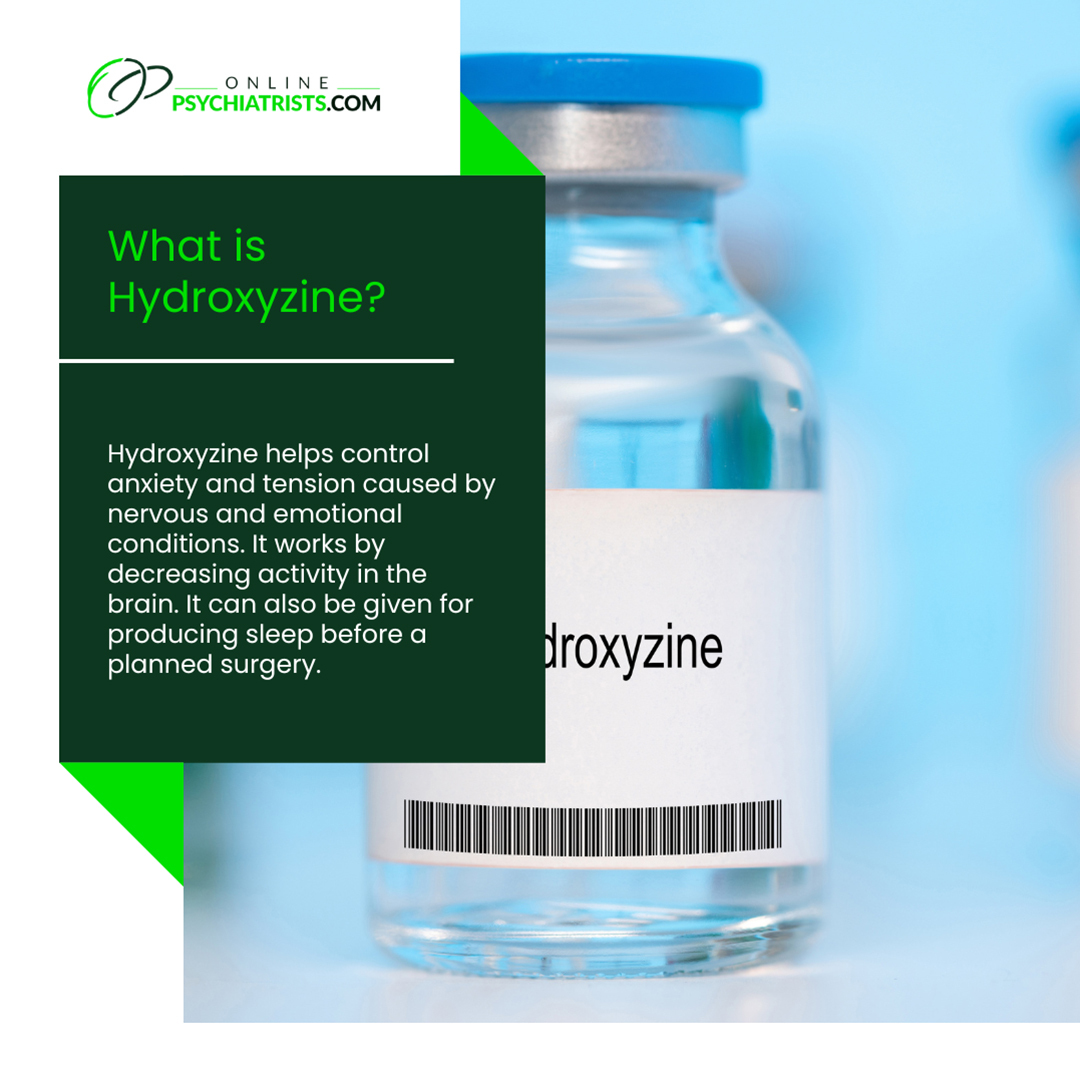

Anxiety disorders affect a large population, and choosing the right medication to address your condition can be overwhelming, considering the several available options. It is best to seek medical advice for anxiety or related symptoms to get the best treatment and therapy. Schedule an appointment with Dr. Zlatin Ivanov for treatment, care, and compassionate help to cope with the problems you are facing. He comes up with personalized treatment plans that address your anxiety-related issues and help you regain control over your life in the shortest possible time.
Hydroxyzine belongs to a class of medications called antihistamines. They work by blocking the action of histamine, an agent in the body that causes allergic symptoms. It is prescribed for adults and children to relieve allergic skin reactions. Hydroxyzine has some unique characteristics, which make it a good choice for treating tension and anxiety-related symptoms. It is used as a sedative before and after general anesthesia for surgery too.
While many antihistamines are available over the counter and can be purchased without a prescription, hydroxyzine is a prescription medicine. It is listed as hydroxyzine hydrochloride (hydroxyzine HCL) or hydroxyzine pamoate (hydroxyzine pam).
Read more: What Does Psychiatric Disorder Mean?
Hydroxyzine helps control anxiety and tension caused by nervous and emotional conditions. It works by decreasing activity in the brain. It can also be given for producing sleep before a planned surgery.
Hydroxyzine is an antihistamine prescribed for relieving anxiety. It is also sometimes used to treat:
Like other histamines, hydroxyzine reduces the effects of histamine, a chemical in the body that causes an allergic reaction. However, it can cause drowsiness, which may interfere with activities such as driving.

Read more: Why Are Therapists Called Shrinks?
Researchers believe that hydroxyzine affects two chemicals in the human body, histamine, and serotonin to treat anxiety. As an antihistamine, hydroxyzine blocks the effects of histamine in the body, which makes you sleepy. Serotonin is a chemical that affects your mood, and hydroxyzine’s unique effect on serotonin is the reason it is suggested for anxiety.
In addition to being an antihistamine, hydroxyzine is also a serotonin antagonist. Hydroxyzine boosts serotonin levels in your brain by blocking it from being reabsorbed into the nerves in your brain, called neurons.
Serotonin is a neurotransmitter that plays a role in keeping your mood balanced. It also enhances feelings of contentment, optimism, satisfaction, and overall sense of well-being. Your doctor may recommend hydroxyzine in capsule, tablet, or liquid/syrup form to help you feel better.
Hydroxyzine pamoate capsules are available in:
Liquid/syrup:
Hydroxyzine hydrochloride (HCL) tablets are available in the following:
Liquid/syrup:
Hydroxyzine is most often used for treating generalized anxiety disorder (GAD), especially when associated with insomnia. However, it should only be taken as prescribed by the doctor to avoid further complications related to anxiety and sleep. In case of an overdose, call emergency services immediately.
For an average adult, doctors recommend 50 to 100 mg dosage, four times a day, but some people may need higher doses to alleviate their symptoms. For children under the age of 6 years, 50 mg per day, divided into small doses is sufficient. It is best to take smaller, multiple doses throughout the day to achieve desired results.
Hydroxyzine can be taken daily, with or without food, at the regularly scheduled time or on an as-needed basis. If you have an upset stomach after taking the medication, it is best to take it with food. Your doctor will guide you regarding the maximum amount to take in a day as well as when to take this medication for maximum benefit.
If you miss a dose, take it as soon as you remember it, or if it is time for the next dose, just take the next one. Do not stop using the medication or increase its dosage without consulting your healthcare provider first.
Hydroxyzine hydrochloride (HCL) and hydroxyzine pamoate (pam) are two versions of the same active ingredient and work the same way to treat anxiety. While hydroxyzine HCL is available in tablets and liquid, hydroxyzine pam is available in capsules and liquid. They are recommended by your doctor to address anxiety in the same way.
You may get the form of medication you prefer or the one that works better for you. Ask your healthcare provider to determine in which form this medication will benefit you more.
Read more: Why Are Therapists Called Shrinks?
Common side effects of hydroxyzine include:
If you experience any of these side effects or unusual symptoms, call your healthcare provider.
Rare or serious side effects of hydroxyzine include:
Seek immediate medical attention if you experience any of these symptoms or other serious side effects to prevent life-threatening consequences.
Avoid drinking alcohol while taking hydroxyzine as alcohol can decrease its benefits and increase side effects. Alcohol is also known to impair memory and judgment, and it may result in taking a higher dose of hydroxyzine than prescribed, which could lead to an accidental overdose.
Symptoms of hydroxyzine overdose include:
Discuss your anxiety treatment plan with your doctor, if you are pregnant or planning a pregnancy. Hydroxyzine should not be taken during the first trimester of pregnancy. You may take it during the second and third trimesters, but not right before or during labor.
You should also avoid taking hydroxyzine while breastfeeding as it can pass to the baby through breast milk. Tell your healthcare provider about any other medications or supplements you are taking before starting hydroxyzine to ensure it does not cause negative interactions.
Hydroxyzine for anxiety works relatively faster than some other medications, like SSRIs. You will notice your symptoms improve quickly, often within hours of first taking it, and feel its maximum effect at around two to four hours.
Remember, while hydroxyzine gets to work quickly, you can also expect many of its potential side effects quickly.
While selective serotonin reuptake inhibitors (SSRIs) and hydroxyzine work almost the same way to relieve anxiety, there are some differences between the two you must keep in mind.
There are other medications as well that can treat anxiety, such as benzodiazepines. Like hydroxyzine, these medications act fast and relieve your symptoms within an hour of taking the first dose. However, there are several significant differences between the two, and you must not take any medication for anxiety or similar symptoms without first asking your doctor.
Most anxiety medications can be habit-forming and lead to dependence. It means your body starts needing the medication to function normally, and if you stop taking it suddenly, you may experience withdrawal symptoms. While hydroxyzine is not habit-forming, you should ask your doctor if hydroxyzine is a good option, particularly if you are concerned about dependency or addiction.
Call Online Psychiatrists to schedule an appointment with Dr. Zlatin Ivanov, an experienced and board-certified psychiatrist, for timely and compassionate treatment of any mental issues you are going through. He prescribes medications to manage your symptoms and relieve anxiety successfully. Dr. Ivanov supports your progress through talk therapy and medication and recommends lifestyle changes such as exercise, nutritional adjustments, and weight loss help you live a better quality of life.

Dr. Zlatin Ivanov, MD, is an adult psychiatrist specializing in addiction treatment, ADHD, anxiety, depression, and OCD. He offers exceptional talk therapy and medication management through online video conferencing.
Dr. Ivanov is double board certified in Psychiatry and Clinical Neurology and a member of the American Psychiatric Association. His medical career is colored by many outstanding contributions to medicine, including several publications, research, and scientific presentations. An attending psychiatrist at Woodhull Medical Center in Brooklyn, NY, and Bellevue Hospital Center in New York City, he takes the time to listen to patients and makes sure they know he is committed to their unique situation.
 Our Locations
Our Locations
The Chrysler Building
405 Lexington Ave, #2601
New York, NY, 10174 (map)
300 Carnegie Center Drive #150K,
Princeton, NJ, 08540 (map)
701 Brickell Avenue, 1550#A,
Miami, FL, 33131 (map)